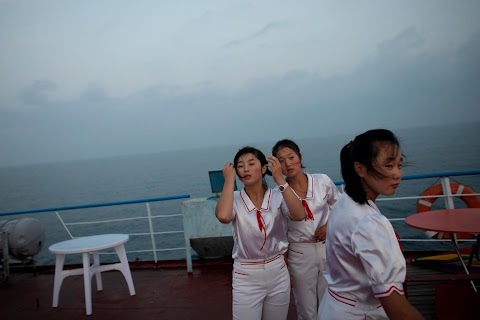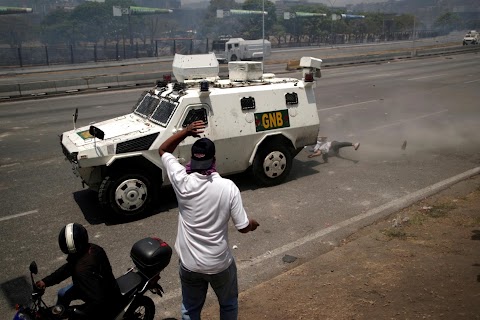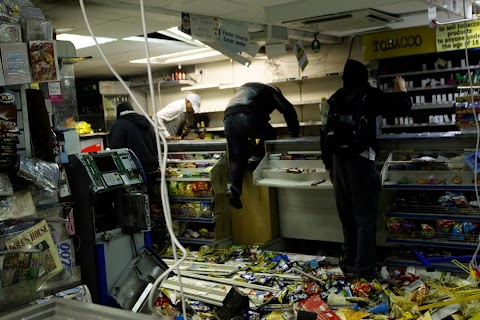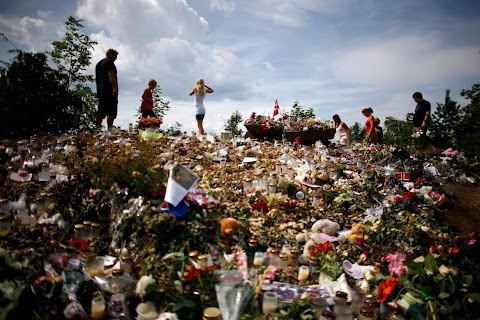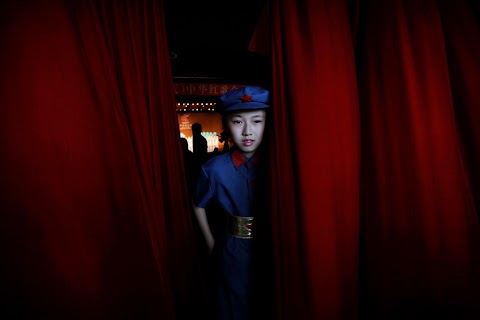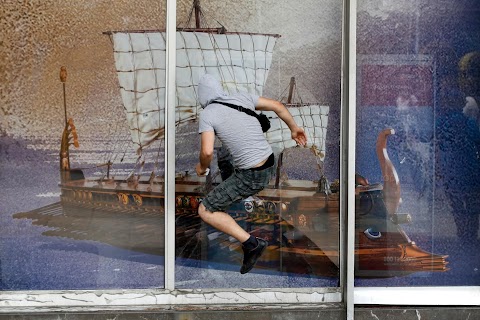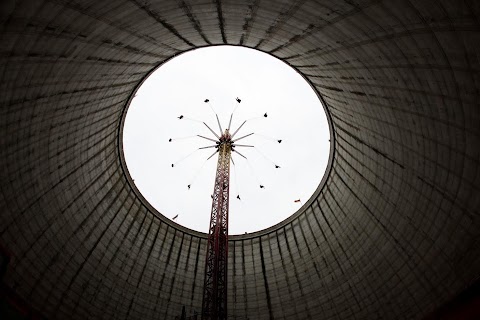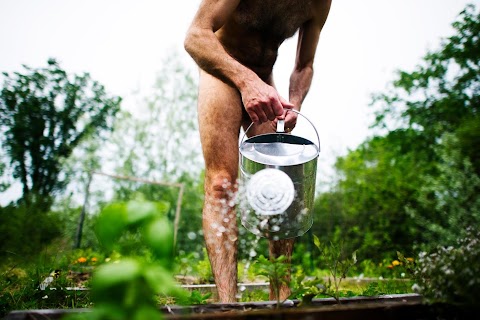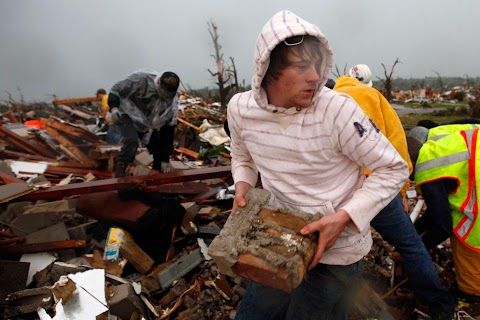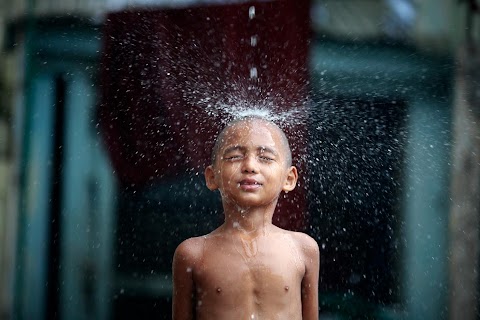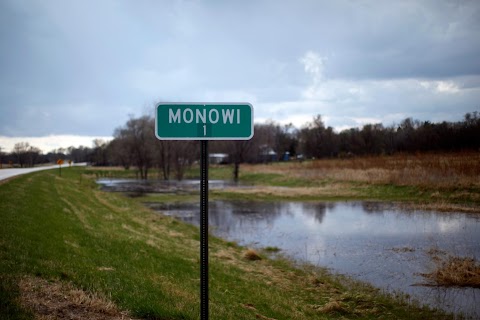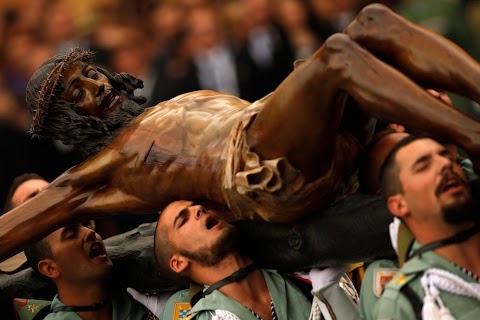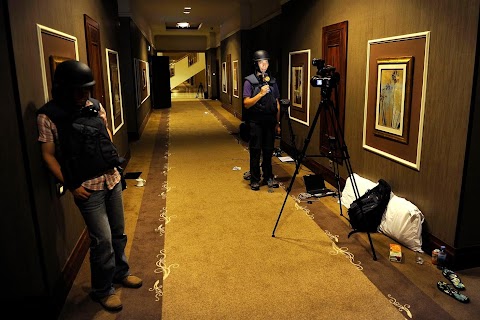
Hostages at the Rixos Hotel
 Paul Hackett
Paul Hackett
Some 35 foreign correspondents and at least two foreign politicians were held by armed Gaddafi loyalists for five days at the Rixos hotel in Tripoli in the summer of 2011, a few months before the former Libyan leader's demise.

A media worker walks under a banner displayed by members of the media staying at the Rixos hotel. The Gaddafi government had used the hotel to house foreign reporters who flocked to Tripoli since Libyans rose up against his rule in February 2011.

An armed man loyal to Libyan leader Gaddafi walks through the hotel.

Media gather in the hotel basement.

A member of the media runs after hearing the noise of gunfire.

Jomana Karadsheh (left), a producer for CNN and Matthew Chance, Senior International Correspondent for CNN are evacuated by the International Red Cross from the Rixos hotel.
"The luxury Rixos had always seemed like a gilded cage"
Most of our weeks in Tripoli's Rixos Hotel as "guests" of Muammar Gaddafi's government were marked by boredom and frustration.
But by the time a sniper's bullet shattered my satellite gear just after I set it up on a roof, the game had changed.
Rebel fighters swarmed into the city on August 18, 2011, taking government officials by surprise with the speed of their assault after months of backward-and-forward combat on several fronts across Libya.
The mood in the Rixos Hotel, designated home to foreign journalists covering the conflict as best they could from the government side, turned to anxiety.
The relationship with government minders who controlled our movements had always been antagonistic.
From August 18 onwards, as gunmen kept the 35 reporters, photographers and television crew penned up in the hotel, it dawned on us that we were pretty much being held hostage and could become human shields.
Food and water ran short, power blacked out. Outside we could hear the din of battle. But we were unable to report the war we had come to cover just as it reached its denouement.
We sweated it out for five days, increasingly fearful that we might become casualties of a fit of rage by our armed guards, a sudden attack by the rebels, or loyalist sniper fire.
When officials of the International Committee of the Red Cross ran into the lobby on the morning of August 22, and told us to grab our gear and run, the relief and elation propelled me out through the door.
GILDED CAGE
The luxury Rixos, with its pillared lobby and opulent decor, had always seemed like a gilded cage set amid the eucalyptus trees.
Even before the rebel assault, correspondents were prohibited from venturing out of the hotel on their own.
When we did leave, government minders hovered nearby during interviews and coached residents on their answers. They carted us to and from pro-Gaddafi rallies and showed us gory sites where they said NATO air strikes had killed civilians.
Gaddafi and his minions showed an absolute conviction his troops would vanquish the rebels it described as rats and traitors. Unfortunately for us, the government saw us as an extension of the Western effort to bring down "the brother leader".
They called us spies who called in coordinates for air strikes.
But their confident, if belligerent, mood changed on August 18, when the rebels cut off Tripoli's sole link to the outside world and raced into the Mediterranean city for the final showdown.
The officials at the Rixos talked urgently into cell phones in the lobby and asked us for information from the frontlines. They still promised to fight to the death - and they warned of an impending massacre no matter who won.
The fighting began after the evening meal of the 18th and raged all night. We heard several air strikes but mostly the roar of mortar or rocket fire and automatic weapons. Tracer bullets landed on our balconies.
On the morning of August 19th, only a few of the hotel staff could be seen. The government minders and other officials either did not show up or melted away over the course of the day.
By nightfall, the hotel was almost deserted except for the pack of journalists, a few other foreigners, four cheerful cooks - and a handful of armed young men.
Government troops stationed outside stood at the ready to protect the hotel and fend off rebels.
FEAR AND TEDIUM
The fighting around the hotel grew more intense. The air was thick with gunfire and the floors shook from the impact of rocket-propelled grenades.
We donned flak jackets and helmets. We carried sacks stuffed with necessities - water, satellite phones, cameras - into a windowless room on the second floor of the hotel.
The few remaining young Libyans, Gaddafi supporters who were incensed by what they saw was our support for the rebels, brandished weapons and shouted at us angrily.
They were suspicious of our communications equipment and visibly on edge.
Over the next few days we drifted back and forth between fear and tedium. All but one of the remaining hotel staff disappeared, so we brought bread, cheese, fruit and bottled water from the hotel's kitchen.
Power and water failed for at least one full day, so we distributed electric candles that someone had found and filled empty bottles for washing from the hotel's Turkish baths.
Fighting continued around the hotel. For much of the time we were unable to make calls on our local cell phones, nor could we venture outside to use satellite phones because of the snipers.
The windows in the restaurant downstairs were shattered by a shot or shrapnel while two colleagues made tea.
A sniper's bullet hit my BGAN, a satellite transmission device, as I sat a few feet away, writing emails. I dashed out of the room.
People stretched out on the floor of the hallway near our safe room, often wearing their body armour, dozing when they could. We draped a banner from the upstairs balcony that said 'press' so gunmen who might enter the hotel would know we were non-combatants.
The fear came and went that the hotel would be the scene of a showdown between Gaddafi forces and rebels.
Even as we received reports that most of Tripoli had fallen, the armed volunteers holding us there against our will were utterly convinced that the rebels would be repelled.
They were diehard Gaddafi supporters who suspected us - cut off from the outside world as we were - of distorting the situation in the rebels' favour.
Camaraderie saw us through the ordeal. We set up an impromptu cinema one day while we were camped out in the basement, but the screening of 'Point Break' on someone's laptop was interrupted by fighting that broke out near the hotel.
Nevertheless, spirits flagged as things wore on and we wondered when we would be freed.
On a desk in a room that had been occupied by government minders, we found printouts of private emails sent by us journalists - apparent evidence that the correspondence had been monitored.
Morning dawned on August 22 after another tense night that brought only a few hours of sleep for most of us and hours of discussions.
A bout of shouting with our armed guards in the lobby ended suddenly when the ICRC team rushed in the door and to our rescue. We didn't wait to settle the bill.
